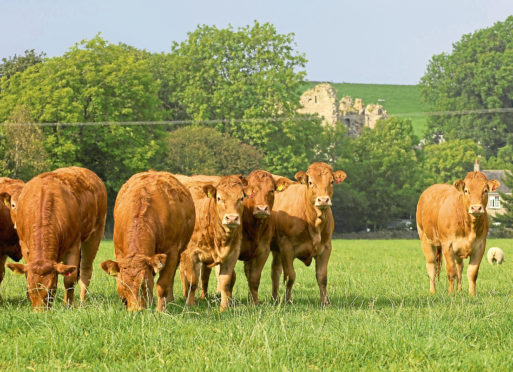The accuracy of estimated breeding values (EBVs) for Limousin cattle has been boosted by an international genetics project.
The British Limousin Cattle Society (BLMS) says all UK producers of pedigree and commercial Limousin-bred cattle will benefit from its involvement in the Interbeef project.
The project, in association with SRUC Egenes, involves the production of across-country EBVs for Limousin, which are now being integrated into UK EBVs.
Data is available from 11 countries – Australia, Czech Republic, Denmark, Finland, France, Germany, Ireland, Spain, Sweden, Switzerland and the UK – covering 2.3million animals with performance records and 2.6m animals with full pedigrees.
The countries have been sharing their records for weaning, or 200-day weight, while calving ease and birth weight records are shared between the UK, Czech Republic, Denmark, France and Ireland.
BLMS chief executive Iain Kerr said: “The incorporation of this level of international data into an evaluation is a welcome first for UK beef breeds and represents a significant opportunity to make increased margins from Limousin genetics.
“It comes close on the heels of incorporating new abattoir data last year that brought over 273,000 new commercial records to the Limousin evaluation as well as the introduction of the now-familiar genomic breeding values in 2016 and 2017.”
He said the addition of the international data had increased the number of animals with performance records in the UK evaluation by around 14%, and boosted the accuracy of some EBVs.
The EBVs directly influenced by the new data are: birthweight; 200-day growth; 200-day milk weight; calving ease; and maternal calving ease.
The accuracy of these is thought to have increased by 18% on the whole, and by as much as 88% in individual cases. Professor Mike Coffey – leader of the animal breeding team at Egenes and SRUC – said: “Having an Interbeef evaluation will allow UK beef producers to have access to international bull semen on a scale relevant to the UK.
“This means foreign bulls that are known to be better can be imported to increase the genetic merit and profitability of UK beef production, whilst UK bulls that rank well internationally can be exported, creating market opportunities,” added Prof Coffey.
